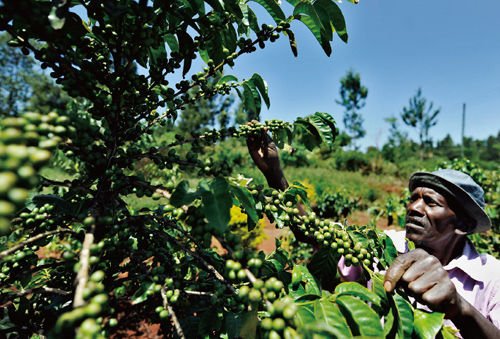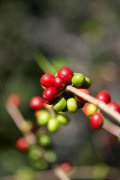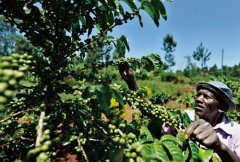Can coffee trees planted in shade grow their own coffee beans?
"Health and quality go hand in hand," said Byron Holcomb, a coffee farmer from Brazil who deliberately grows coffee in full sun. "healthy coffee is more likely to get good quality. From a botanical point of view, coffee is a kind of lower shrub vegetation, it is born to grow under taller trees, and such trees are the so-called shade vegetation for coffee. "

However, it is hard to say that the conditions that provide a healthy environment for coffee growth and benefit the soil have a big impact on the cup of coffee you end up drinking. A study by Shawn Steiman of the University of Hawaii at Manoa focused on the effects of agricultural and forestry conditions on the yield and quality of coffee. He believes that although the amount of sunlight a coffee tree gets has an effect on its flavor, it cannot predict the flavor of coffee at all.
"the taste of coffee is affected by many factors," Steiman said. "if you generalize them with the concept of 'soil conditions', it refers to an interaction between the ecological environment, precipitation conditions and temperature-obviously, plant growth is closely related to them. Therefore, the influence of sunlight only plays a part in the 'local conditions', but it must not be the only factor to be considered. " He added.
Holcomb points out that there are some coffee that are widely respected around the world that do not grow in shade. Kenyan coffee is a good example. "Shade promotes the growth of coffee because it gives coffee a natural environment that is closer to its nature, so I think it promotes some of the characteristics of coffee from a genetic point of view, which in turn makes it taste good in the coffee cup," Holcomb said. "but having said that, the theory of causality is called into question. All other things being equal, shading may not have much effect on coffee quality, and we know that magical Kenyan coffee is grown in a high-altitude environment without shade. "
For shade planting, the more realistic sustainable question is: is it economically a realistic choice for coffee farmers to plant other vegetation at intervals for shade conditions, thereby reducing coffee planting density and resulting in less yield? Especially in the absence of clear evidence that coffee grown in shade tastes better.
And the real influencing factors are more likely to be consumers themselves, especially the feeling that we have when we drink "shade-grown" coffee is the same as when we buy biodiversity, permanently cultured, environmentally friendly coffee-- the feeling that our own views are accepted. That is to say, associating "better" coffee with shade planting is a more romantic view than a more scientific one.
Important Notice :
前街咖啡 FrontStreet Coffee has moved to new addredd:
FrontStreet Coffee Address: 315,Donghua East Road,GuangZhou
Tel:020 38364473
- Prev

On Coffee blending and Coffee Baking Fine Coffee Baking beans Coffee Baking
The ideal way is to buy a small amount of raw beans, bake them yourself, and grind the beans directly before making coffee. However, most of us have to buy baked beans, and maybe this number will increase in the near future. When storing beans, the biggest enemy is water. The volatile oils that give us aroma in the cup are soluble in water, and a humid environment can affect the oil.
- Next

Can coffee trees planted in shade grow their own coffee beans?
Health and quality go hand in hand, says Byron Holcomb, a coffee farmer from Brazil. He deliberately grows coffee in the sun, and healthy coffee is more likely to get good quality. From a botanical point of view, coffee is a kind of lower shrub vegetation, which naturally needs to grow under taller trees, and such trees are the so-called shade plants for coffee.
Related
- Beginners will see the "Coffee pull flower" guide!
- What is the difference between ice blog purified milk and ordinary milk coffee?
- Why is the Philippines the largest producer of crops in Liberia?
- For coffee extraction, should the fine powder be retained?
- How does extracted espresso fill pressed powder? How much strength does it take to press the powder?
- How to make jasmine cold extract coffee? Is the jasmine + latte good?
- Will this little toy really make the coffee taste better? How does Lily Drip affect coffee extraction?
- Will the action of slapping the filter cup also affect coffee extraction?
- What's the difference between powder-to-water ratio and powder-to-liquid ratio?
- What is the Ethiopian local species? What does it have to do with Heirloom native species?

